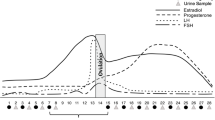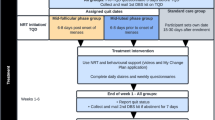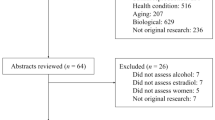Abstract
Research examining relations between menstrual cycle phase and female addictive behaviors is accumulating. Theories suggest addictive behaviors may increase during specific phases of the menstrual cycle resulting from cyclical fluctuations in hormones and affect. In line with self-medication theory, we predicted that addictive behaviors would increase premenstrually and menstrually, phases marked by elevations in negative affect, relative to the follicular and luteal phases. We also hypothesized, coinciding with reward-sensitivity theory, that addictive behaviors may increase during ovulation, a phase characterized by increased positive affect, compared to the same phases. This systematic review summarizes extant literature examining the menstrual cycle phase-addictive behavior relationship and underlying motivations. Articles pertaining to menstrual cycle phase and addictive behaviors within the PsycINFO, CINAL, and PubMED databases were screened to determine eligibility following PRISMA guidelines (n = 1568). Thirty-four articles examining alcohol use, cannabis use, nicotine use, caffeine use, and gambling behavior across menstrual cycle phase met inclusion criteria. Consistent with self-medication theory, strong evidence indicated that nicotine use increased premenstrually and menstrually. Other factors increasing both nicotine and alcohol use premenstrually and menstrually include having a premenstrual dysphoric disorder diagnosis or having premenstrual syndrome. Motivations for using alcohol and nicotine may too vary by menstrual cycle phase. Results were less consistent or understudied for other addictive behaviors and thus conclusions cannot be drawn. Menstrual cycle phase appears to be a female-specific factor affecting some addictive behaviors, particularly nicotine use, and should be considered when conducting addictive behavior research or clinical interventions for reproductive-aged females with addictive disorders.

Similar content being viewed by others
Notes
Throughout this manuscript, we refer to biological sex (female) versus the socially constructed term gender (women). We use sex (versus gender) as participants in the reviewed studies were biologically female with a menstrual cycle. Since individuals who are biologically female do not always identify as women (gender), we believe it is more appropriate to use the term female (versus woman).
References
Aganoff JA, Boyle GJ (1994) Aerobic exercise, mood states and menstrual cycle symptoms. J Psychosom Res 38:183–192. https://doi.org/10.1016/0022-3999(94)90114-7
Allen D (1996) Are alcoholic women more likely to drink premenstrually? Alcohol Alcohol 31:145–147. https://doi.org/10.1093/oxfordjournals.alcalc.a008125
Allen SS, Hatsukami D, Christianson D, Nelson D (1996) Symptomatology and energy intake during the menstrual cycle in smoking women. J Subst Abu 8:303–319. https://doi.org/10.1016/S0899-3289(96)90170-4
Allen SS, Allen AM, Pomerleau CS (2009a) Influence of phase-related variability in premenstrual symptomatology, mood, smoking withdrawal, and smoking behavior during ad libitum smoking, on smoking cessation outcome. Addict Behav 34:107–111. https://doi.org/10.1016/j.addbeh.2008.08.009
Allen AM, Mooney M, Chakraborty R, Allen SS (2009b) Circadian patterns of ad libitum smoking by menstrual phase. Hum Psychopharmacolo 24:503–506. https://doi.org/10.1002/hup.1039
Allen AM, Lundeen K, Eberly LE, Allen SS, Al’Absi M, Muramoto M, Hatsukami D (2018) Hormonal contraceptive use in smokers: prevalence of use and associations with smoking motives. Addict Behav 77:187–192. https://doi.org/10.1016/j.addbeh.2017.10.011
American Psychiatric Association (2013) Diagnostic and statistical manual of mental disorders, 5th edn. Author, Washington, DC
Anker JJ, Carroll ME (2011) Females are more vulnerable to drug abuse than males: evidence from preclinical studies and the role of ovarian hormones. Curr Top Behav Neurosci 8:73–96. https://doi.org/10.1007/7854_2010_93
Arbeau KJ, Kuiken D, Wild TC (2011) Drinking to enhance and to cope: a daily process study of motive specificity. Addict Behav 36:1174–1183. https://doi.org/10.1016/j.addbeh.2011.07.020
Belfer ML, Shader RI (1971) Alcoholism in women. Arch Gen Psychiat 25:540–544
Charette L, Tate DL, Wilson A (1990) Alcohol consumption and menstrual distress in women at higher and lower risk for alcoholism. Alcohol Clin Exp Res 14:152–157. https://doi.org/10.1111/j.1530-0277.1990.tb00462.x
Chen Y, Katuščák P, Ozdenoren E (2013) Why can’t a woman bid more like a man? Games Econ Behav 77:181–213. https://doi.org/10.1016/j.geb.2012.10.002
Christensen AP, Oei TPS, Callan VJ (1989) The relationship between premenstrual dysphoria and daily ratings dimensions. J Affect Disord 16:127–132. https://doi.org/10.1016/0165-0327(89)90066-9
Cohen LS, Soares CN, Otto MW, Sweeney BH, Liberman R, Harlow BL (2002) Prevalence and predictors of premenstrual dysphoric disorder (PMDD) in older premenopausal women: the Harvard study of moods and cycles. J Affect Disord 70:125–132. https://doi.org/10.1016/S0165-0327(01)00458-X
Collins A, Eneroth P, Landgren BM (1985) Psychoneuroendocrine stress responses and mood as related to the menstrual cycle. Psychosom Med 47:512–527. https://doi.org/10.1097/00006842-198511000-00002
DeBon M, Klesges RC, Klesges LM (1995) Symptomatology across the menstrual cycle in smoking and nonsmoking women. Addict Behav 20:335–343. https://doi.org/10.1016/0306-4603(94)00070-F
Dickerson LM, Mazyck PJ, Hunter MH (2003) Premenstrual syndrome. Am Fam Physician 67:1743–1752. https://doi.org/10.1016/0002-9378(81)90417-8
Direkvand-Moghadam A, Sayehmiri K, Delpisheh A, Kaikhavandi S (2014) Epidemiology of premenstrual syndrome (PMS) - a systematic review and meta-analysis study. J Clin Diagn Res 8:106–109. https://doi.org/10.7860/JCDR/2014/8024.4021
Dreher J-C, Schmidt PJ, Kohn P, Furman D, Rubinow D, Berman KF (2007) Menstrual cycle phase modulates reward-related neural function in women. Proc Natl Acad Sci U S A104:2465–2470. https://doi.org/10.1073/pnas.0605569104
Dumas MC, Calliet LL, Tumblin IG, King AR (1984) Menstrual cycle influences on alcohol consumption among blacks. J Black Psychol 11:9–18.10.1177/009579848401100102
Epstein EE, Rhines KC, Cook S, Zdep-Mattocks B, Jensen NK, McCrady BS (2006) Changes in alcohol craving and consumption by phase of menstrual cycle in alcohol dependent women. J Subst Use 11:323–332. https://doi.org/10.1080/14659890500419717
Evans SM, Haney M, Levin FR, Foltin RW, Fischman MW (1998) Mood and performance changes in women with premenstrual dysphoric disorder: acute effects of alprazolam. Neuropsychopharmacology 19:499–516. https://doi.org/10.1016/S0893-133X(98)00064-5
Feher J (2012) Female reproductive physiology. In: Feher J (ed) Quantitative human physiology. Academic Press, Boston, pp 846–855
Grant BF, Goldstein RB, Saha TD, Chou SP, Jung J, Zhang H, Pickering RP, Ruan WU, Smith SM, Huang B, Hasin DS (2015) Epidemiology of DSM-5 alcohol use disorder: results from the national epidemiologic survey on alcohol and related conditions III. JAMA Psychiatry 72:757–766. https://doi.org/10.1001/jamapsychiatry.2015.0584
Greenfield TK, Ye Y, Bond J, Kerr WC, Nayak MB, Kaskutas LA, Anton RF, Litten RZ, Kranzler HR (2014) Risks of alcohol use disorders related to drinking patterns in the U.S. general population. J Stud Alcohol Drugs 75:319–327. https://doi.org/10.15288/jsad.2014.75.319
Griffin JE, Ojeda SR (2004) Textbook of endocrine physiology. Oxford University Press, New York
Griffin ML, Mendelson JH, Mello NK, Lex BW (1986) Marihuana use across the menstrual cycle. Drug Alcohol Depend 18:213–224. https://doi.org/10.1016/0376-8716(86)90053-0
Griffin ML, Mello NK, Mendelson JH, Lex BW (1987) Alcohol use across the menstrual cycle among marihuana users. Alcohol 4:457–462. https://doi.org/10.1016/0741-8329(87)90085-1
Groome NP, Illingworth PJ, O’Brien M, Pai R, Rodger FE, Mather JP, McNeilly AS (1996) Measurement of dimeric inhibin b throughout the human menstrual cycle. J Clin Endocrinol Metab 81:1401–1405. https://doi.org/10.1210/jc.81.4.1401
Halbreich U, Endicott J, Schacht S, Nee J (1982) The diversity of premenstrual changes as reflected in the premenstrual assessment form. Acta Psychiatr Scand 65:46–65. https://doi.org/10.1111/j.1600-0447.1982.tb00820.x
Halbreich U, Borenstein J, Pearlstein T, Kahn LS (2003) The prevalence, impairment, impact, and burden of premenstrual dysphoric disorder (PMS/PMDD). Psychoneuroendocrinology 28:1–23. https://doi.org/10.1016/S0306-4530(03)00098-2
Hall P (2018) Understanding and treating sex and pornography addiction. Routledge, London
Halliday A, Bush B, Cleary P, Aronson M, Delbanco T (1986) Alcohol abuse in women seeking gynecologic care. Obstet Gynecol 68:322–326. https://doi.org/10.1097/00006250-1986090000-00006
Hanzal N, Joyce KM, Tibbo P, Stewart SH (2019) A pilot daily diary study of changes in stress and cannabis use quantity across the menstrual cycle. Cannabis 2:120–134. https://doi.org/10.26828/cannabis.2019.02.002
Harvey SM, Beckman LJ (1985) Cyclic fluctuation in alcohol consumption among female social drinkers. Alcohol Clin Exp Res 9:465–467. https://doi.org/10.1111/j.1530-0277.1985.tb05584.x
Hasin DS, Stinson FS, Ogburn E, Grant BF (2007) Prevalence, correlates, disability, and comorbidity of DSM-IV alcohol abuse and dependence in the United States: results from the national epidemiologic survey on alcohol and related conditions. Arch Gen Psychiatry 64:830–842. https://doi.org/10.1001/archpsyc.64.7.830
Hong JP, Park S, Wang HR, Chang SM, Sohn JH, Jeon HJ, Lee HW, Cho SJ, Kim BS, Bae JN, Cho MJ (2012) Prevalence, correlates, comorbidities, and suicidal tendencies of premenstrual dysphoric disorder in a nationwide sample of Korean women. Soc Psychiatry Psychiatr Epidemiol 47:1937–1945. https://doi.org/10.1007/s00127-012-0509-6
Ifland JR, Preuss HG, Marcus MT, Rourke KM, Taylor WC, Burau K, Jacobs WS, Kadish W, Manso G (2009) Refined food addiction: a classic substance use disorder. Med Hypotheses 75:518–526. https://doi.org/10.1016/j.mehy.2008.11.035
Johannes CB, Linet MS, Stewart WF, Celentano DD, Lipton RB, Szklo M (1995) Relationship of headache to phase of the menstrual cycle among young women: a daily diary study. Neurology 45:1076–1082. https://doi.org/10.1212/WNL.45.6.1076
Joyce KM, Stewart S (2018) Standardization of menstrual cycle data for the analysis of intensive longitudinal data. In: Lutsenko OI (ed) Menstrual cycle. Intech Open Science, United Kingdom
Joyce KM, Hudson A, O’Connor R, Thompson K, Hodgin M, Perrot T, Stewart SH (2018) Changes in coping and social motives for drinking and alcohol consumption across the menstrual cycle. Depress Anxiety 35:313–320. https://doi.org/10.1002/da.22699
Joyce KM, Hudson A, O’Connor RM, Goldstein AL, Ellery M, Perrot TS, Stewart SH (2019) Retrospective and prospective assessments of gambling-related behaviors across the female menstrual cycle. J Behav Addict 8:135–145. https://doi.org/10.1556/2006.7.2018.133
Keyes KM, Grant BF, Hasin DS (2008) Evidence for a closing gender gap in alcohol use, abuse, and dependence in the United States population. Drug Alcohol Depend 93:21–29. https://doi.org/10.1016/j.drugalcdep.2007.08.017
Khantzian EJ (1997) The self-medication hypothesis of substance use disorders: a reconsideration and recent applications. Harv Rev Psychiatry 4:231–244. https://doi.org/10.3109/10673229709030550
Levy M, Koeppen B, Stanton B (2000) Berne and levy principles of physiology. Mosby, St. Louis, Missouri
Liberati A, Altman DG, Tetzlaff J, Mulrow C, Gøtzsche PC, Ioannidis JPA et al (2009) The PRISMA statement for reporting systematic reviews and meta-analyses of studies that evaluate healthcare interventions: explanation and elaboration. BMJ 339:b2700
Lynch WJ, Sofuoglu M (2010) Role of progesterone in nicotine addiction: evidence from initiation to relapse. Exp Clin Psychopharmacol 18:451–461. https://doi.org/10.1037/a0021265
Marks JL, Hair CS, Klock SC, Ginsburg BE, Pomerleau CS (1994) Effects of menstrual phase on intake of nicotine, caffeine, and alcohol and nonprescribed drugs in women with late luteal phase dysphoric disorder. J Subst Abus 6:235–243. https://doi.org/10.1016/S0899-3289(94)90265-8
Martel MM, Eisenlohr-Moul T, Roberts B (2017) Interactive effects of ovarian steroid hormones on alcohol use and binge drinking across the menstrual cycle. J Abnorm Psychol 126:1104–1113. https://doi.org/10.1037/abn0000304
McHugh RK, Wigderson S, Greenfield SF (2014) Epidemiology of substance use in reproductive-age women. Obstet Gynecol Clin N Am 41:177–189. https://doi.org/10.1016/j.ogc.2014.02.001
McHugh RK, Votaw VR, Sugarman DE, Greenfield SF (2018) Sex and gender differences in substance use disorders. Clin Psychol Rev 66:12–23. https://doi.org/10.1016/j.cpr.2017.10.012
McLeod DR, Foster GV, Hoehn-Saric R, Svikis DS, Hipsley PA (1994) Family history of alcoholism in women with generalized anxiety disorder who have premenstrual syndrome: patient reports of premenstrual alcohol consumption and symptoms of anxiety. Alcohol Clin Exp Res 18:664–670
Mello NK, Mendelson JH (1985) Operant acquisition of marihuana by women. J Pharmacol Exp Ther 235:162–171
Mello NK, Mendelson JH, Palmieri SL (1987) Cigarette smoking by women: interactions with alcohol use. Psychopharmacology 93:8–15. https://doi.org/10.1007/BF02439579
Mello NK, Mendelson JH, Lex BW (1990) Alcohol use and premenstrual symptoms in social drinkers. Psychopharmacology 101:448–455
Mendrek A, Dinh-Williams L, Bourque J, Potvin S (2014) Sex differences and menstrual cycle phase-dependent modulation of craving for cigarette: an fMRI pilot study. Psychiatry J 2014:1–7. https://doi.org/10.1155/2014.723632
Miech R, Johnston L, O’Malley PM, Bachman JG, Patrick ME (2019) Trends in adolescent vaping, 2017–2019. N Engl J Med 381:1490–1491. https://doi.org/10.1056/NEJMc1910739
Moran-Santa Maria MM, Flanagan J, Brady K (2014) Ovarian hormones and drug abuse. Curr Psychiatry Rep 16:511. https://doi.org/10.1007/s11920-014-0511-7
Mumenthaler MS, Taylor JL, O’Hara R, Yesavage JA (1999) Gender differences in moderate drinking effects. Alcohol Res Health 23:55–64
Münster K, Schmidt L, Helm P (1992) Length and variation in the menstrual cycle: a cross-sectional study from a Danish county. Br J Obstet Gynaecol 99:422–429. https://doi.org/10.1111/j.1471-0528.1992.tb13762.x
Ozgocer T, Ucar C, Yildiz S (2017) Cortisol awakening response is blunted and pain perception is increased during menses in cyclic women. Psychoneuroendocrinology 77:158–164. https://doi.org/10.1016/j.psyneuen.2016.12.011
Pastor AD, Evans SM (2003) Alcohol outcome expectancies and risk for alcohol use problems in women with and without a family history of alcoholism. Drug Alcohol Depend 70:201–214. https://doi.org/10.1016/S0376-8716(03)00007-3
Pearson M, Schipper BC (2013) Menstrual cycle and competitive bidding. Games Econ Behav 78:1–20. https://doi.org/10.1016/j.geb.2012.10.008
Pehlivanoglu B, Balkanci ZD, Ridvanagaoglu AY, Durmazlar N, Öztürk G, Erbas D, Okur H (2001) Impact of stress, gender and menstrual cycle on immune system: possible role of nitric oxide. Arch Physiol Biochem 109:383–387. https://doi.org/10.1076/apab.109.4.383.4234
Perkins KA, Levine M, Marcus M, Shiffman S, D’Amico D, Miller A, Keins A, Ashcon J, Broge M (2000) Tobacco withdrawal in women and menstrual cycle phase. J Consult Clin Psychol 68:176–180. https://doi.org/10.1037/0022-006X.68.1.176
Pomerleau CS, Cole PA, Lumley MA, Marks JL, Pomerleau OF (1994) Effects of menstrual phase on nicotine, alcohol, and caffeine intake in smokers. J Subst Abus 6:227–234. https://doi.org/10.1016/S0899-3289(94)90253-4
Reed BG, Carr BR (2000) The Normal Menstrual Cycle and the Control of Ovulation. In: Feingold KR et al (eds) Endotext
Reed SC, Levin FR, Evans SM (2008) Changes in mood, cognitive performance and appetite in the late luteal and follicular phases of the menstrual cycle in women with and without PMDD (premenstrual dysphoric disorder). Horm Behav 54:185–193. https://doi.org/10.1016/j.yhbeh.2008.02.018
Saah T (2005) The evolutionary origins and significance of drug addiction. Harm Reduct J 2:1–7. https://doi.org/10.1186/1477-7517-2-8
Sakai H, Ohashi K (2013) Association of menstrual phase with smoking behavior, mood and menstrual phase-associated symptoms among young Japanese women smokers. BMC Womens Health 13:10. https://doi.org/10.1186/1472-6874-13-10
Sakaki M, Mather M (2012) How reward and emotional stimuli induce different reactions across the menstrual cycle. Soc Personal Psychol Compass 6:1–17. https://doi.org/10.1111/j.1751-9004.2011.00415.x
Saladin ME, McClure EA, Baker NL, Carpenter MJ, Ramakrishnan V, Hartwell KJ, Gray KM (2015) Increasing progesterone levels are associated with smoking abstinence among free-cycling women smokers who receive brief pharmacotherapy. Nicotine Tob Res 17:398–406. https://doi.org/10.1093/ntr/ntu262
Slade T, Chapman C, Swift W, Keyes K, Tonks Z, Teesson M (2016) Birth cohort trends in the global epidemiology of alcohol use and alcohol-related harms in men and women: systematic review and metaregression. BMJ Open 6:e011827. https://doi.org/10.1136/bmjopen-2016-011827
Snively TA, Ahijevych KL, Bernhard LA, Wewers ME (2000) Smoking behavior, dysphoric states and the menstrual cycle: results from single smoking sessions and the natural environment. Psychoneuroendocrinology 25:677–691. https://doi.org/10.1016/S0306-4530(00)00018-4
Soares CN, Zitek B (2008) Reproductive hormone sensitivity and risk for depression across the female life cycle: a continuum of vulnerability? J Psychiatry Neurosci 33:331–343
Steinberg JL, Cherek DR (1989) Menstrual cycle and cigarette smoking behavior. Addict Behav 14:173–179. https://doi.org/10.1016/0306-4603(89)90045-2
Steiner M, Pearlstein T, Cohen LS, Endicott J, Kornstein SG, Roberts C, Yonkers K (2006) Expert guidelines for the treatment of severe PMS, PMDD, and comorbidities: the role of SSRIs. J Women's Health 15:57–69. https://doi.org/10.1089/jwh.2006.15.57
Stewart SH, Gavric D, Collins P (2009) Women, girls, and alcohol. In: Brady K, Back S, Greenfield S (eds) Women and addiction: a comprehensive handbook. Guilford Press, New York, pp 341–359
Sussman S, Sussman AN (2011) Considering the definition of addiction. Int J Environ Res Public Health 8:4025–4038. https://doi.org/10.3390/ijerph8104025
Sutker PB, Libet JM, Allain AN, Randall CL (1983) Alcohol use, negative mood states, and menstrual cycle phases. Alcohol Clin Exp Res 7:327–331
Svikis DS, Miles DR, Haug NA, Perry B, Hoehn-Saric R, McLeod D (2006) Premenstrual symptomatology, alcohol consumption, and family history of alcoholism in women with premenstrual syndrome. J Stud Alcohol 67:833–836. https://doi.org/10.15288/jsa.2006.67.833
Tate DL, Charette L (1991) Personality, alcohol consumption, and menstrual distress in young women. Alcohol Clin Exp Res 15:647–652. https://doi.org/10.1111/j.1530-0277.1001.tb00573.x
Tobin MB, Schmidt PJ, Rubinow DR (1994) Reported alcohol use in women with premenstrual syndrome. Am J Psychiatry 151:1503–1504. https://doi.org/10.1176/ajp.151.10.1503
Wharton W, Gleason CE, Olson SRMS, Carlsson CM, Asthana S (2012) Neurobiological underpinnings of the estrogen - mood relationship. Curr Psychiatr Rev 8:247–256. https://doi.org/10.2174/157340012800792957
Wittchen H-U, Becker E, Lieb R, Krause P (2002) Prevalence, incidence and stability of premenstrual dysphoric disorder in the community. Psychol Med 32:119–132. https://doi.org/10.1017/s0033291701004925
Wray JM, Gray KM, Mcclure EA, Carpenter MJ, Tiffany ST, Saladin ME (2014) Gender differences in responses to cues presented in the natural environment of cigarette smokers. Nicotine Tob Res 17:438–442. https://doi.org/10.1093/ntr/ntu248
Funding
At the time of conducting this review, K.M.J.’s graduate studies were supported by a Nova Scotia Graduate Scholarship, a Scotia Scholar Award from the Nova Scotia Health Research Foundation (NSHRF), a Joseph Armand Bombardier Canada Graduate Scholarship from the Social Sciences and Humanities Research Council of Canada (SSHRC), a University of Manitoba Graduate Fellowship, and a Master’s Studentship Award from Research Manitoba in partnership with the Children's Hospital Research Institute of Manitoba. K.G.’s research was supported by the Canadian Institutes of Health Research (CIHR) and the NSHRF. P.T. was supported by a Dr. Paul Janssen Chair in Psychotic Disorders, and S.H.S by a CIHR Tier 1 Canada Research Chair in Addictions and Mental Health at Dalhousie University.
Author information
Authors and Affiliations
Corresponding author
Ethics declarations
Conflict of interest
The authors declare that they have no conflict of interest.
Ethical approval
This article is a synthesis of published research in the field and thus ethics approval was not required by the authors.
Informed consent
This article is a synthesis of published research in the field and thus, informed consent was not required by the authors.
Additional information
Publisher’s note
Springer Nature remains neutral with regard to jurisdictional claims in published maps and institutional affiliations.
Supplementary Information
Online Resource 1
Caption Search criteria used for literature searches within PsycINFO, CIHAHL, and PubMed databases (DOCX 14 kb)
Online Resource 2
Caption Characteristics of studies excluded at the full-text review stage (DOCX 14 kb)
Online Resource 3
Caption List of references excluded at the full-text screening state as reported in online resource 2 (DOCX 14 kb)
Rights and permissions
About this article
Cite this article
Joyce, K.M., Good, K.P., Tibbo, P. et al. Addictive behaviors across the menstrual cycle: a systematic review. Arch Womens Ment Health 24, 529–542 (2021). https://doi.org/10.1007/s00737-020-01094-0
Received:
Accepted:
Published:
Issue Date:
DOI: https://doi.org/10.1007/s00737-020-01094-0




